Panic around new variant has shifted focus from testing-tracing to locking borders. Travel bans batter the economy, hinder lab supplies and slow down scientists investigating new pathogens. The humble mask is still your best weapon against the virus
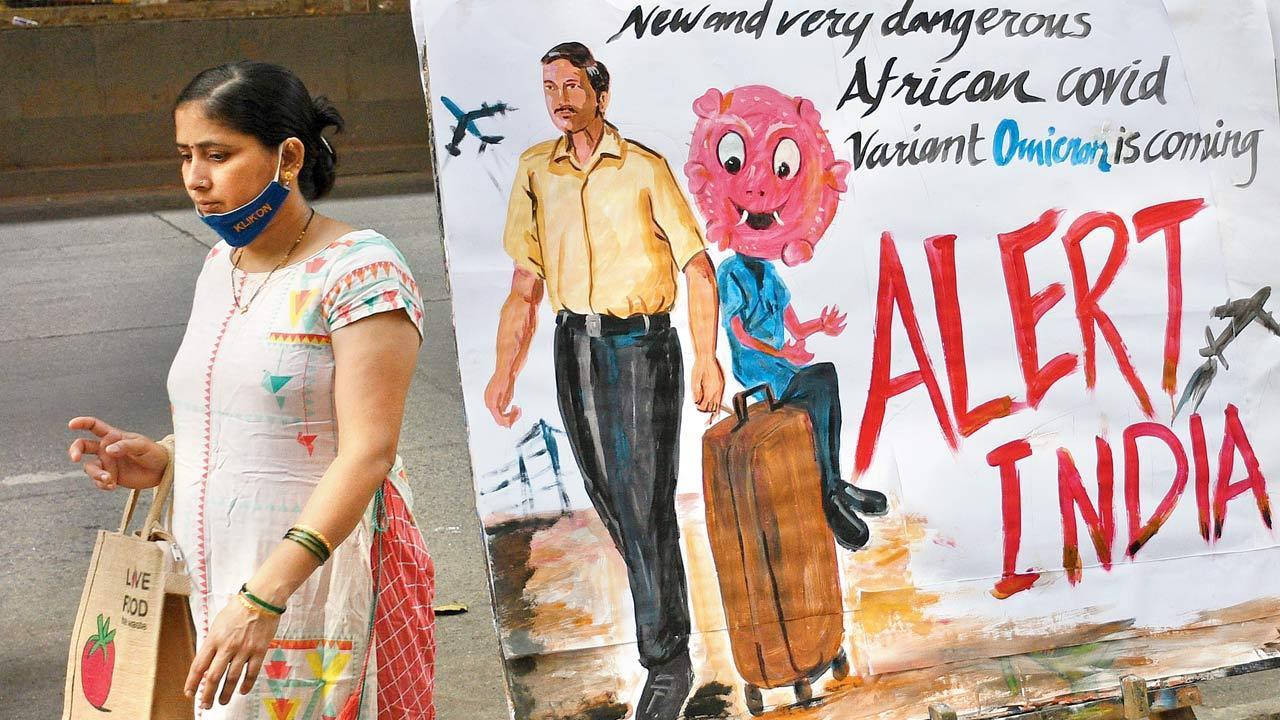
A woman with her mask lowered walks past a painting made by Gurukul School of Art in Mumbai to spread awareness about the Omicron variant. Pic/Getty Images
Last year, when the World Health Organisation (WHO) declared the Coronavirus pandemic a public health emergency, more than 70 countries were quick to impose travel restrictions against China, prompting an investigation into the hypothesis that the Coronavirus SARS-CoV-2 virus had emerged from the Wuhan Institute of Virology (WIV). While the fractious debate on the origin of COVID-19 has been put on the backburner, the focus is now on the origin of Omicron, the latest variant of the COVID-causing SARS COV-2 virus, which seems all set to replace Delta as the dominant global strain. While Tulio de Oliveira, the director of the Centre for Epidemic Response and Innovation at Stellenbosch University, in South Africa, and his team were the first to alert the WHO and other authorities to the new variant on November 24, recent news that the variant may have existed in the Netherlands a week prior, begs the question whether the travel bans imposed swiftly against the country are an appropriate response to the heavily-mutated variant.
ADVERTISEMENT
The EU, US, Canada, UK, Russia, Japan and India were some of the first to announce the travel ban which South African President Cyril Ramaphosa called discriminatory. He said the country instead of being hailed for strong genetic sequencing networks was in fact, being punished for alerting global health authorities.
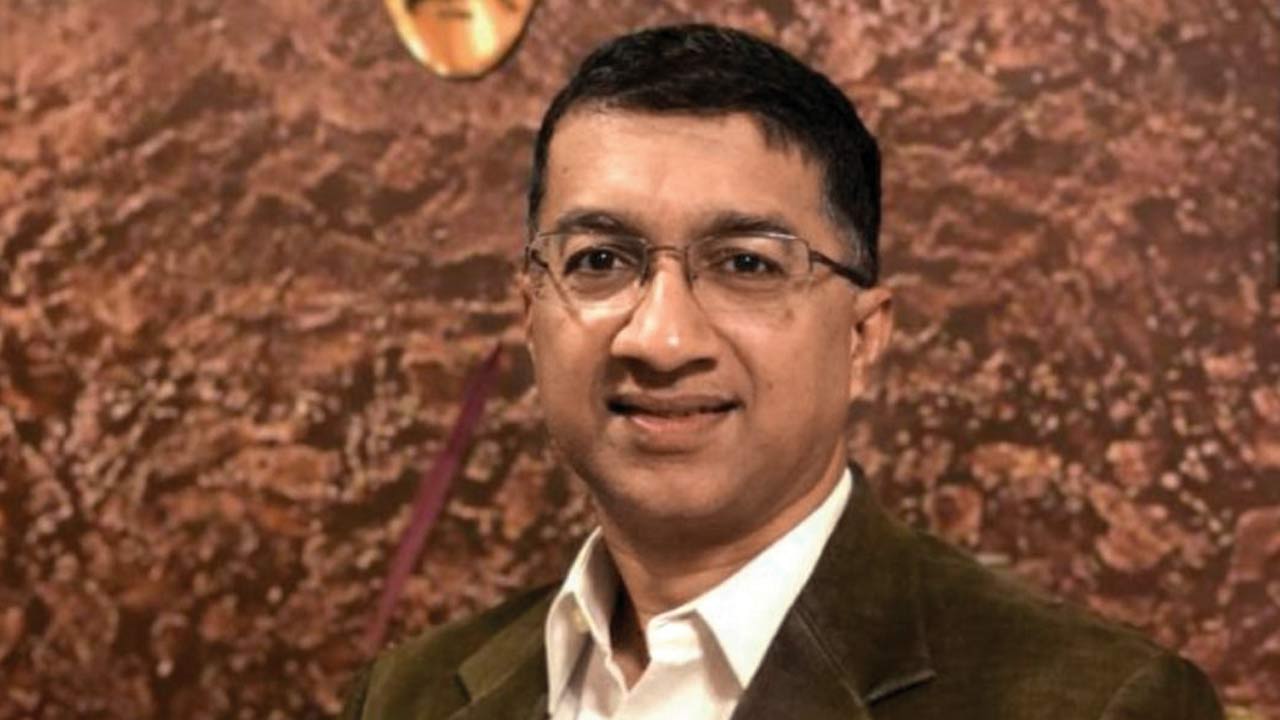 Dr MP Cariappa
Dr MP Cariappa
Scientists and public health experts are now calling into question the logic of implementing blanket travel bans to stop a virus that’s spreading too rapidly to contain in a single part of the world. “And rightly so,” thinks Dr MP Cariappa, Public Health Specialist and former director of medical services to the Government of India. In jest, he likens Omicron (pronounced oh-mai-krawn) to “Oh-My-God”.
More than 30 countries have closed their borders to at-risk nations and others have imposed strict measures in the hope that Omicron won’t enter their territory via travellers. UK was the first country to ban flights. It prompted the WHO to issue a statement late last week that the blanket travel bans are having an impact on global cooperation against the Coronavirus variant by delaying the sharing of laboratory samples from South Africa that could help research into the new strain.
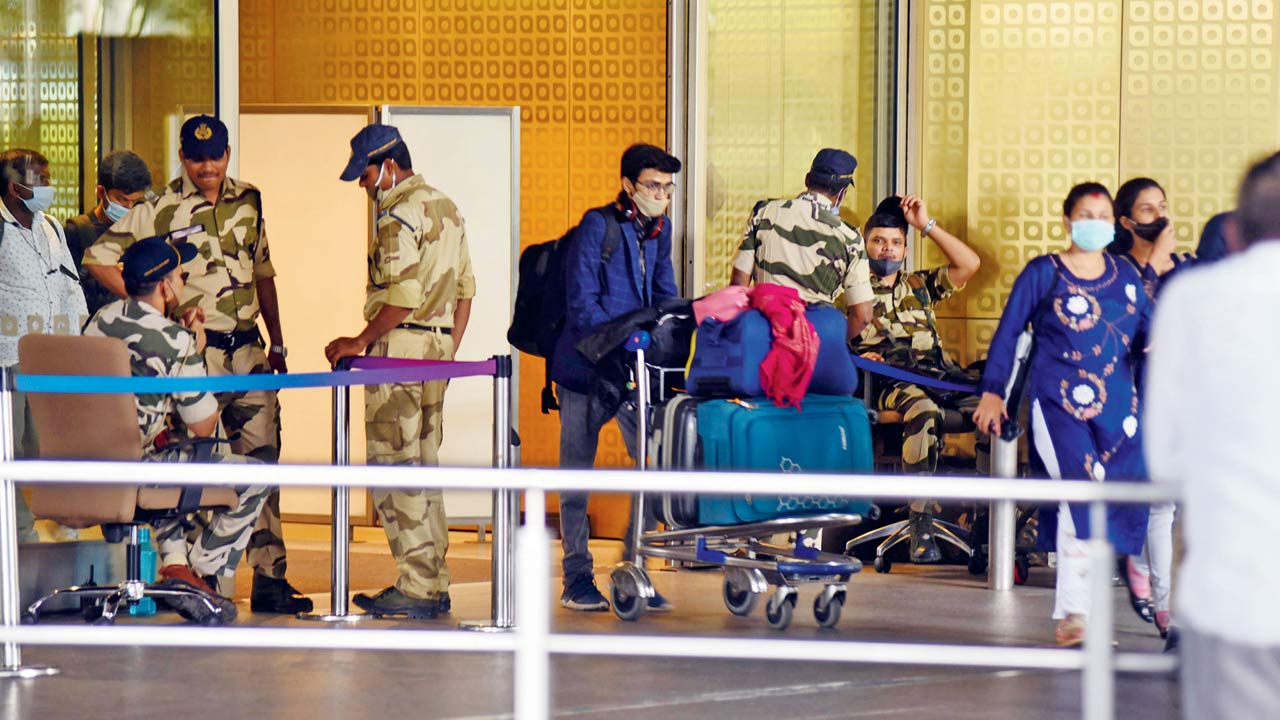 Passengers at the Chhatrapati Shivaji Maharaj International Airport. From December 1, India instituted new rules for international passengers arriving into the country. There are separate protocols for those from ‘at risk’ countries, including testing on arrival and mandatory quarantine. The samples of those found positive will be sent for genome sequencing. Pic/Sameer Markande
Passengers at the Chhatrapati Shivaji Maharaj International Airport. From December 1, India instituted new rules for international passengers arriving into the country. There are separate protocols for those from ‘at risk’ countries, including testing on arrival and mandatory quarantine. The samples of those found positive will be sent for genome sequencing. Pic/Sameer Markande
In fact, South Africa-based Dr Angelique Coetzee, who first spotted the new variant, went on record to clarify that the world is overreacting. In an interview, Coetzee said, “Patients I’ve seen had mild symptoms and recovered. The hype makes no sense.”
India on Thursday reported its first two cases of Omicron from Karnataka—in a South African national and a Bengaluru doctor with no travel history. Both men were fully vaccinated. On Saturday, Gujarat registered its first Omicron case and so did Maharashtra. At the time of going to press, the total Omicron cases across India stood at four.
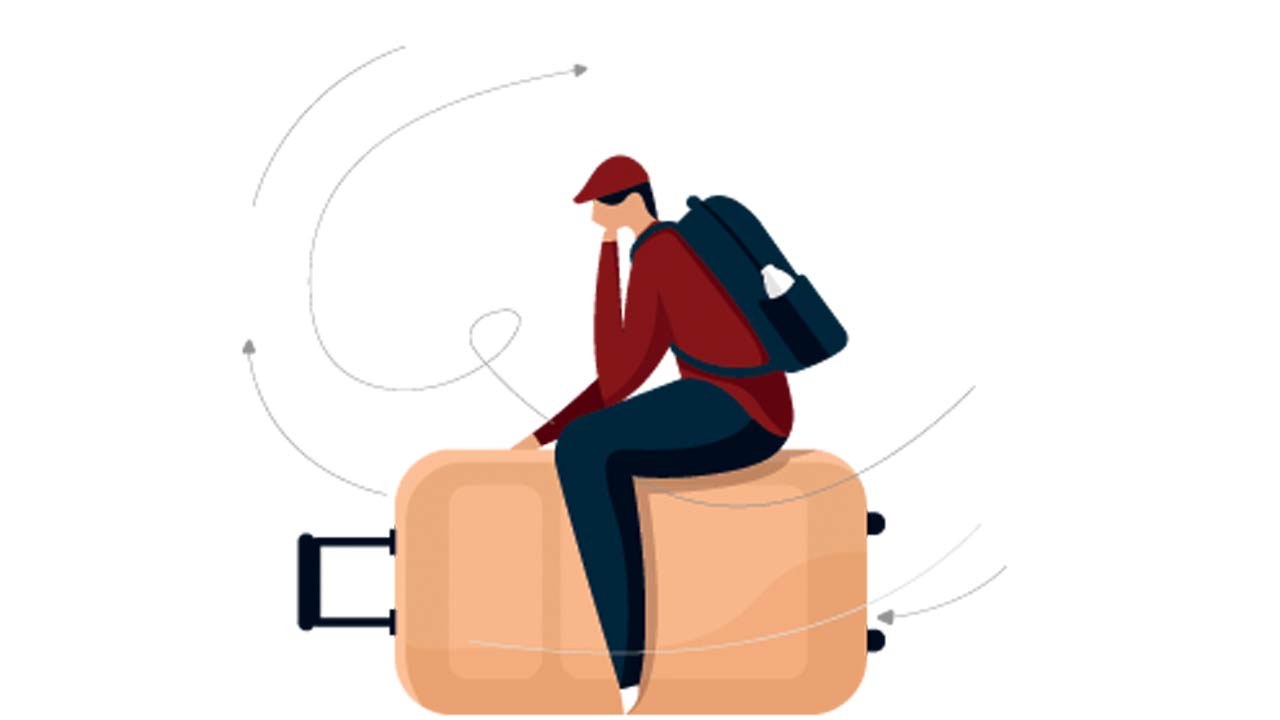
This sensationalising is not based on science or evidence, points out Dr Cariappa, adding that mutation is a natural process in the journey of every virus. “At this point, it’s easy to be a Cassandra [Greek mythological figure who accurately predicted the fall of Troy] and say, ‘See this is what’s going to happen’. If this doesn’t [happen], you’re still in the safe because at least people didn’t die. But policies like travel bans damage the economy tremendously. If you don’t have goods flowing in and out and money moving, it affects health in the long run.”
According to the WHO, evidence shows that restricting the movement of people and goods during public health emergencies interrupts aid and technical support, and slows down research into the new variant. Lab supplies can be hit and samples can’t be shared across the world. Reports state that Tulio de Oliveira has already warned that they could be running out of sequencing reagents. The stigma of travel bans can also exacerbate racism and xenophobia, according to Nicole Errett of the University of Washington, who was the lead author on the Journal of Emergency Management study.
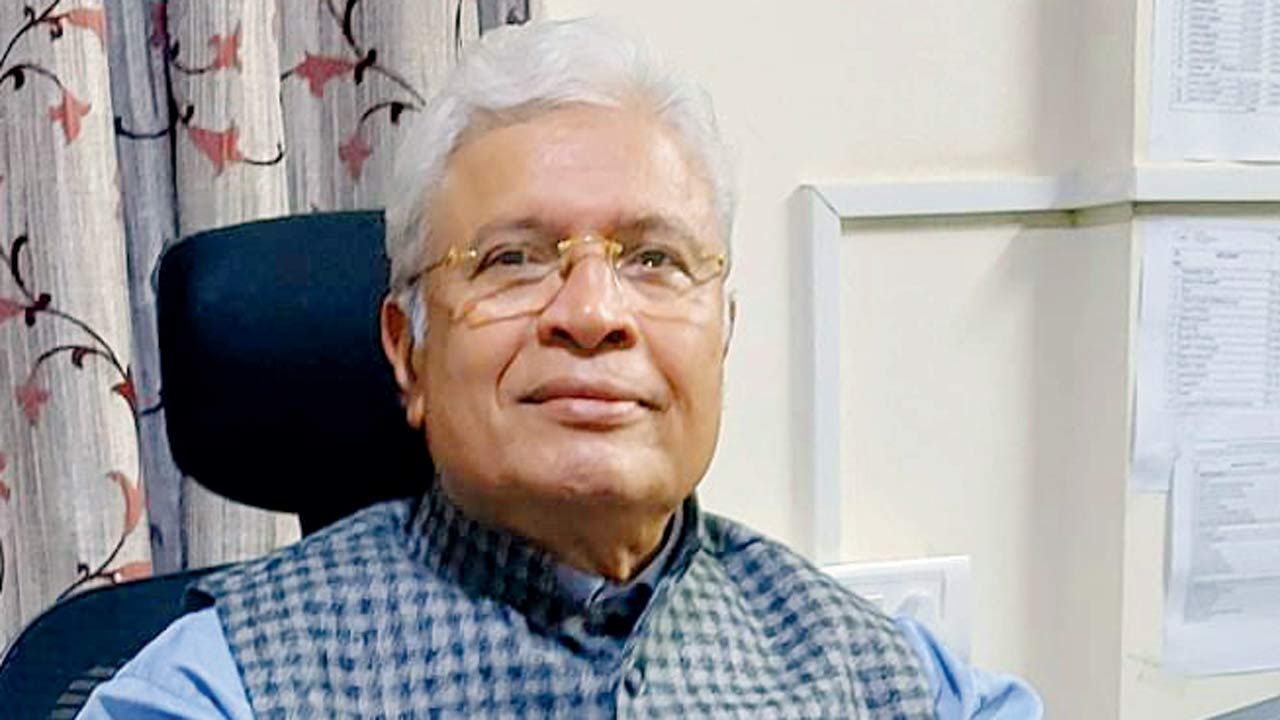 Dr Subhash Salunke
Dr Subhash Salunke
Public health expert Professor Alex Van Den Heever, Chair of Social Security Systems Administration and Management Studies in the School of Governance at the Wits University, Johannesburg, pointed at the inefficacy of travel bans in an interview with mid-day. “Countries are not learning. What has been shown is that COVID-19 cannot be kept out of a country with partial travel bans, and that complete travel bans are unsustainable.”
According to Dr Cariappa, the International Health Regulation, an instrument of international law that is legally-binding on 196 countries, states that travel restrictions will be placed only in specific circumstances. The body revised its framework in 2015 after the SARS outbreak in Asia to “avoid unnecessary interference with international traffic and trade”. “But, in the current scenario, even a gram panchayat is issuing travel restrictions into a village. The pandemic is right now a panic-demic.”
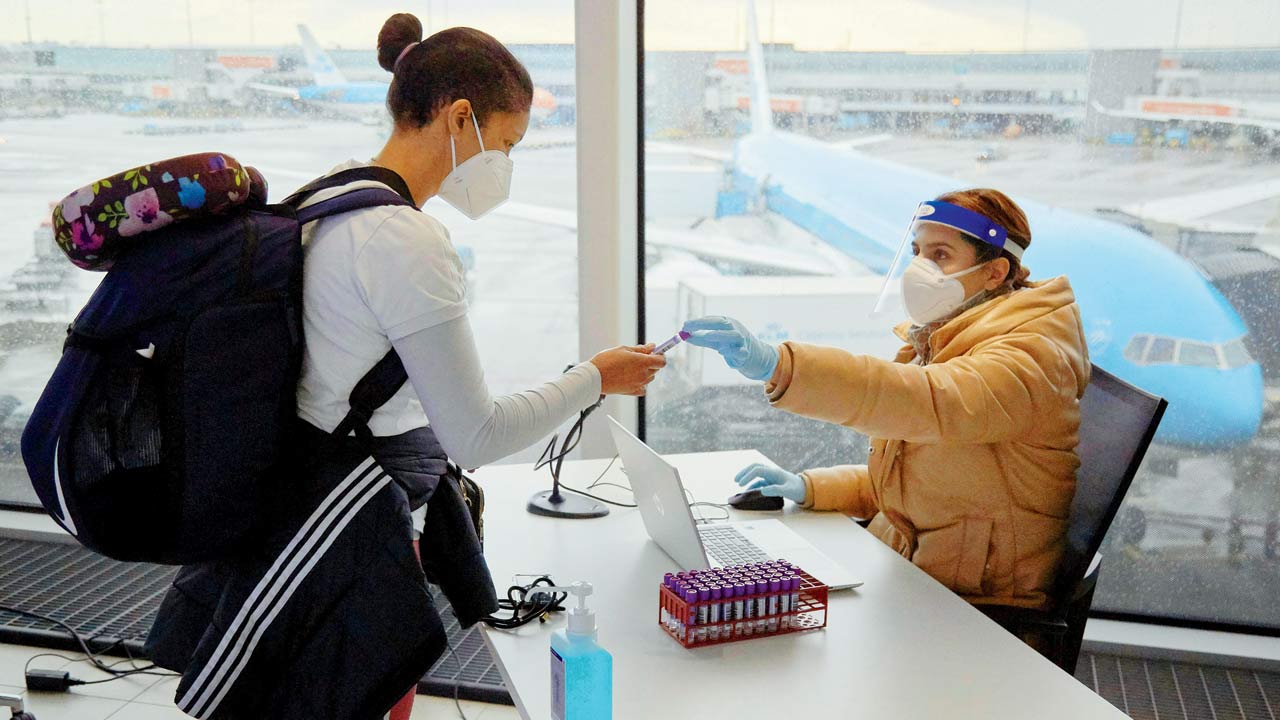 A passenger from a flight from South Africa is tested for the Coronavirus at Amsterdam Schiphol airport on December 2. The Netherlands and other nations worldwide temporarily banned travellers from South Africa after the emergence of the Omicron variant. Interestingly, it has emerged that Netherlands could have had Omicron cases a week before SA identified them. Pic/Getty Images
A passenger from a flight from South Africa is tested for the Coronavirus at Amsterdam Schiphol airport on December 2. The Netherlands and other nations worldwide temporarily banned travellers from South Africa after the emergence of the Omicron variant. Interestingly, it has emerged that Netherlands could have had Omicron cases a week before SA identified them. Pic/Getty Images
As a public health professional, what’s of greater concern to him at this point, he says, is determining whether this is an “antigenic shift,” an abrupt, major change in a virus. When a shift happens, most people have little or no immunity against the new virus. On the other hand, flu viruses change all the time due to “antigenic drift”, which unlike the antigenic shift, happens more frequently. A drift consists of small changes (or mutations) in the genes of influenza viruses that can lead to changes in the surface proteins of the virus. “The worry is not the mutation, but the transmission rate or R0 and that can’t be predicted instantly. We have to wait for the data to come in.” Anthony Fauci, the US government’s top infectious disease advisor, is said to have told president Joe Biden that it would take two weeks to have definitive answers surrounding the queries on Omicron.
But there are those who argue that travel bans can be effective if used correctly. Dr Subhash Salunke, state advisor on COVID-19 and former director general of health services (Maharashtra), says travel restrictions are usually justified at the beginning of an outbreak since they allow states and countries to buy time, even if only a few days, to rapidly implement effective preparedness measures. They also help in not adding more cases to the existing pool. “Is it a foolproof mechanism? No,” he says. “At this point, we need to quickly ramp up our surveillance system, aggressively take on contact tracing and track down every possible case and contact, just like we did at the peak of the pandemic during the first and second waves. I won’t be surprised or too concerned if we discover cases in India. What’s important is to ensure there are no cluster outbreaks of Omicron. The fact that the Bengaluru doctor who tested positive for the variant has no travel history indicates that there’s a likelihood that the strain may have entered at the community level.”
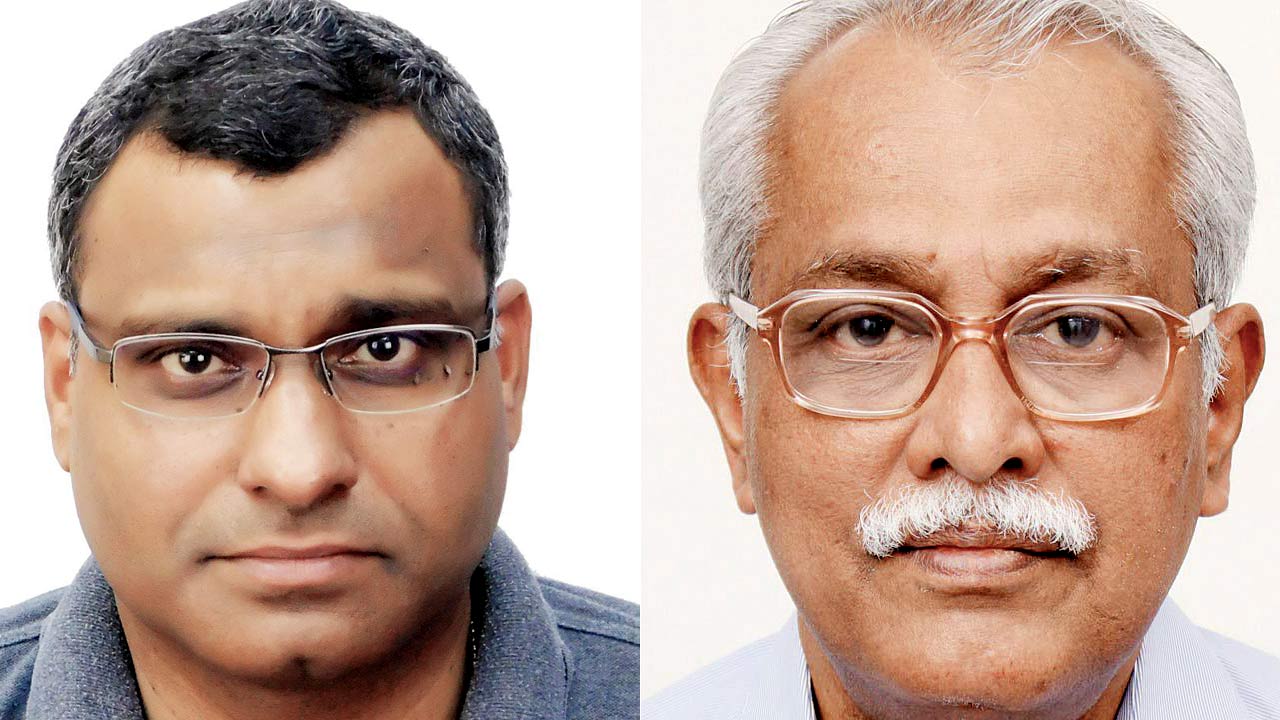 Dr Rajiv Sarkar and Dr Jayaprakash Muliyil
Dr Rajiv Sarkar and Dr Jayaprakash Muliyil
Friday’s top headlines confirmed the criticality of contact tracing. The Andhra Pradesh administration has been hunting for 30 international travellers to conduct the RT-PCR test after they “disappeared” on landing in the country. According to reports, some of them are not responding to telephone calls and officials fear they may have gone missing. Dr Poornima Dhake, medical officer, Kalyan-Dombivli Municipal Corporation (KDMC), says international passengers are resisting getting tested on arrival. “Their excuse is that they are already carrying COVID-19 negative test reports, which is necessary when boarding a flight. We are now sending trained medical officers to convince them [to get the RT-PCR test done].”
Dr Rajiv Sarkar, epidemiologist and Associate Professor at the Indian Institute of Public Health, Shillong, says more often than not, countries are behind the curve in a pandemic, making travel bans redundant. “You usually pick up the strain after it has affected a certain percentage of the population. For instance, the moment South Africa reported it, other countries started looking for Omicron and found it, which means that it was present and spreading. There will continue to be leaks due to asymptomatic transmissions. Even an RT-PCR will not pick up the infection if it’s at an early stage. You need a certain number of viral particles for an infection to show up.” Dr Cariappa says it’s also important to remember that air travel is not the only means of movement. “There’s land, sea, and people also cross borders on foot. How will you prevent spread from here?” Experts fear that the bans could backfire if they are seen as punitive, and make countries less likely to share information about new variants when they discover them in their territory.
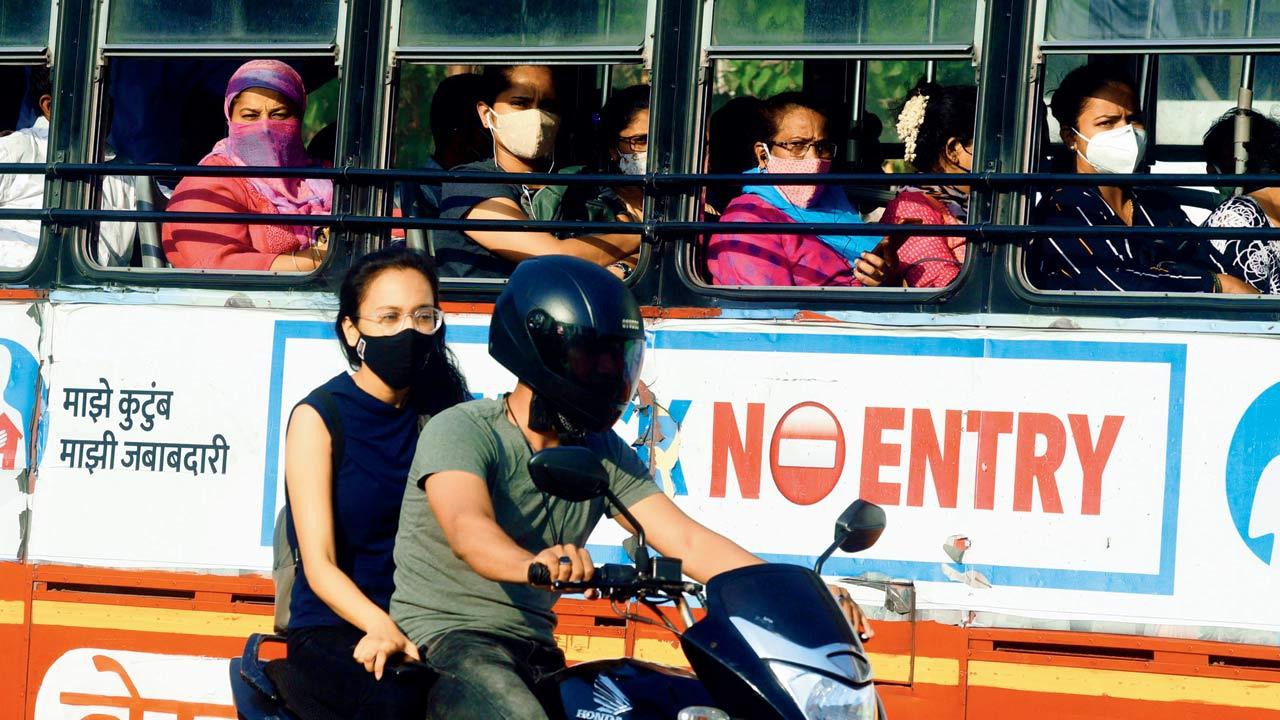 Ventilation is key, say public health experts. If you are travelling in a local bus or train, avoid air conditioning and keep all windows open. Pic/Atul Kamble
Ventilation is key, say public health experts. If you are travelling in a local bus or train, avoid air conditioning and keep all windows open. Pic/Atul Kamble
The need of the hour for countries across the world is to focus on behavioural change instead, feels Dr Cariappa. Proper masking, double vaccination and hand hygiene is still your best shot at prevention. “Let’s be practical and focus on ventilation, and preventing people from spitting in public, and coughing and sneezing without masks on. If you’re travelling in a local bus or train, avoid air conditioning and keep all windows open. Introduce exhaust or blowing ventilation in closed spaces. Also, the common junta is selfish. Telling them to wear a mask for the larger good won’t work. We need to educate them about what’s in it for them. At stake is the life and health of their loved ones.”
Dr Sarkar thinks government policy plays a critical role since much of this boils down to striking a balance between opening up the economy versus finding innovative ways to reduce transmission. While continuing with the vaccination drive is the way forward, what we need to focus on is ways to reduce physical contact, he thinks. “Enforcing limited hours for shops and restaurants to operate is a bad idea because you’re unwittingly leading to crowding [in available work hours].” He says existing evidence is sufficiently strong to warrant that COVID-19 is a predominantly airborne transmission. “We need to engage with engineers for effective aeration, air disinfection and avoiding air recirculation. It’s time we think about how we can do this in a mall, cinema hall, transport and restaurants. These are the issues we need to be talking about, not bans.”
Dr Jayaprakash Muliyil, Chairman of the Scientific Advisory Committee of the ICMR-National Institute of Epidemiology, says Omicron is not the last variant we are going to see. “This strain has been hanging around for a while, and the best way to assess it is to find out if it’s causing reinfection on a previously infected person. If yes, then it’s of concern.” He stresses that the reassuring fact is that the measures we’ve been using to control the spread of COVID-19—mask-use, symptomatic getting tested and isolated, close contacts going into quarantine, and hand hygiene—are health measures that will work to control the spread of this variant, too. “This is a disease that can be prevented by the use of a simple mask. So what the heck are we worried about?
When tightest bans didn’t help
Australia imposed one of the strictest travel bans since the onslaught of the pandemic. The country reopened its international borders for the first time in November this year. Despite the restrictions, two passengers who arrived in Sydney tested positive for the Omicron variant. Currently, it has halted all flights from Botswana, Eswatini, Lesotho, Malawi, Mozambique, Namibia, Seychelles, South Africa and Zimbabwe for the next 14 days.
Vietnam, too, adopted a strict approach to control transmission. It had imposed one of the longest travel bans, opening its borders for the first time this month. Vietnam’s travel restrictions—supported by enforced quarantine and contact tracing—helped it quash the spread. But according to Our World in Data, the country recorded a seven-day rolling average of 13,830 new cases last Wednesday, higher than the peak of the last wave of infections in September. Concern over the Omicron variant has driven the Southeast Asian country to suspend all flights from Africa and it is no longer issuing visas for some African nations.
New Zealand closed its borders in March last year, requiring all international arrivals to undergo two weeks of hotel quarantine. In October this year, it saw its biggest rise in COVID-19 infections in six weeks, with all cases detected in Auckland. The country has also banned travel from nine African countries, including South Africa, Namibia, Zimbabwe, Botswana, Lesotho, Eswatini, Seychelles, Malawi and Mozambique.
‘More infectious than predecessor, but doesn’t mean zero vaccine efficacy’
Dr Trupti Gilada, Infectious Disease Specialist, Masina Hospital, Mumbai, says the unknowns of the Omicron variant outweigh what we know so far about it. “Gauging from reports coming out of South Africa we know that this strain is definitely much more infectious than its predecessor, which means that it will spread at a faster speed and infect more people. Since there are a lot more mutations, as compared to the Delta variant and other previous variants, some of the mutations are in the spike protein region. This region is important for neutralising anti-bodies formed through vaccination or previous infection. So there is a fear that this variant might evade vaccine immunity, but when we talk about evading the vaccine immunity we are not talking about zero efficacy of the vaccine. The vaccine might be less effective but there will still be some protection against this variant from severe infections or the need for hospitalisation, although this fact remains to be confirmed,” she says. The aspect that is yet to be assessed is the severity of the disease. “Early reports show the severity is milder, but a confirmation on whether Omicron is less severe than the previous variants requires more data.”
‘Educate passengers on travel etiquette’
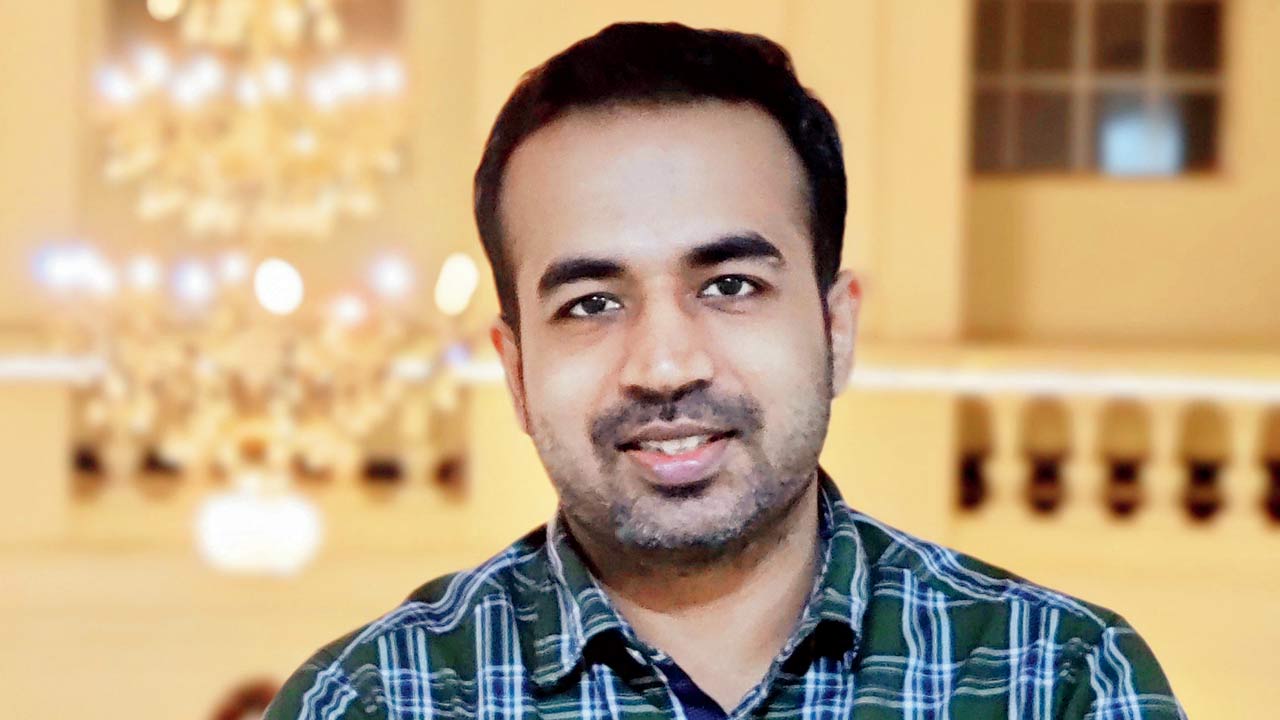
Chirag Agrawal is the co-founder of TravClan, a B2B travel platform that empowers travel agents by helping them book flights, hotels, holidays with suppliers across the world at best B2Bprices.
. Compared to a year-and-a-half ago, travel bans are less likely to be effective now because international travel is mostly allowed only for double vaccinated individuals. Such travellers are anyway less likely to contract COVID-19. Instead of imposing blanket bans on travel, there can be a more layered strategy.
. Educate passengers on better air travel etiquette, double masking and self regulation. Passengers should not travel if they are unwell or may have been exposed to someone from high-risk countries. They should consider downloading the airline’s app to reduce the need for contact with the airport staff. They must bear responsibility and follow the rules of cities, states, countries they fly into.
. Encourage/introduce better measures to people to come forward and notify themselves/ their contacts if they test positive. This would avoid under-reporting and instead of people hiding their status due to the stigma or inconvenience caused by being positive after international travel.
. Educate and even reward people for being responsible citizens so that they participate collectively and willingly in tackling the virus.
 Subscribe today by clicking the link and stay updated with the latest news!" Click here!
Subscribe today by clicking the link and stay updated with the latest news!" Click here!







